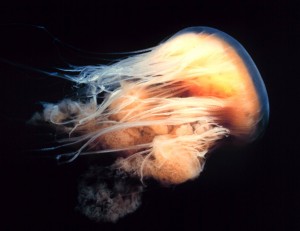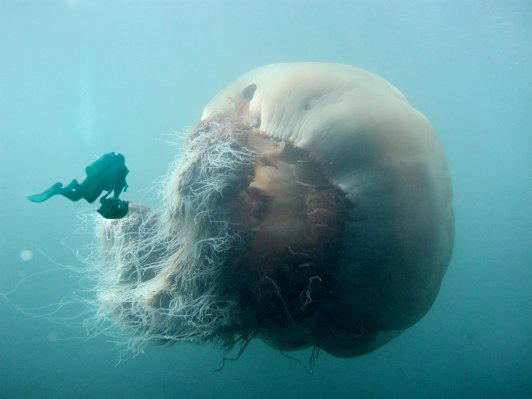
Have you ever read about the “Adventure of the Lion’s Mane”? In the story, Sherlock Holmes is enjoying his retirement in a sandy beach in Sussex chatting with his good friend Harold Stackhurst, when suddenly Stackhurt’s science master Fitzroy McPherson staggers up to them in agony, mentions the words “lion’s mane”, collapses, and dies. All over McPherson’s back were found red welts, as if he was attacked by a whip of some sort. Then, after a series of fantastical plot twists including a beautiful maiden, a love affair, a dog thrown out of a plate-glass window, and a bit of alcohol withdrawal syndrome, Holmes finally realizes that the devious mind behind the murder did, in fact, not have much of a mind at all. Conan Doyle writes, “Cyanea capillata is the miscreant’s full name, and he can be as dangerous to life as, and far more painful than, the bite of the cobra.”
Cyanea capillata is the lion’s mane jellyfish. I think its name fits perfectly. This jellyfish is just as magnificent, beautiful, and fearful as a lion’s mane.

The sting of the lion’s mane jellyfish may cause itching, burning, irritation, and cramping to a localized area on the body, but encounters with these jellyfish are very rarely fatal. However, as Conan Doyle mentioned previously, the sting from one of these guys is extremely painful. You REALLY don’t want to be near one that’s able to split into a gazillion pieces.
Here’s a video of the murderer on the prowl:
So just how big can C. capillata get? For one thing, it definitely can’t get this big:

Dr. McClain posted an article about this photograph of the lion’s mane jellyfish, proving it to be photoshopped. However, there is absolutely no doubt that the lion’s mane jellyfish is a monster. One specimen was discovered washed up ashore on Massachusetts Bay with tentacles 120 feet long. That’s longer than a blue whale, making this jellyfish a contender for the longest animal in the world! However, seeing as how most specimens don’t grow to that size, I wanted to make sure I could find the original citation of this specimen. After a lengthy search, I dropped in onto this email chain. Here’s a quick summary of the lion’s mane jellyfish findings:
- Specimens in the southeast coast of Norway (Skagerrak strait) usually had bell diameters of less than 0.3 meters.
- Most specimens in the Bering Sea near Alaska had bell diameters less than 0.4 meters.
- A lion’s mane was observed in Monterey Bay with a bell size of about 0.67 meters.
- One found in Pacific coast of Southwest Alaska in the summer of 2001 with a bell diameter of somewhere between 0.6 and 0.9 meters.
- One with a 0.91 meter bell was reported in M’Intosh, W.C. 1885. Notes from the St Andrews Marine Laboratory. I. On the British species of Cyanea, and the reproduction of Mytilus edulis. Ann. Mag. nat. Hist. ser. 5. 15: 148-152.
- There were several photos of Cyanea capillata from the state of Washington in May 1998 with a bell diameter of about 1.2 meters.
- An Alaskan fisherman may have spotted one with a bell length of at least 2 meters.
- The historic 2.3 meter specimen that is mentioned again and again in pop media was detailed in Agassis, A. 1865. Illustrated Catalogue of the Museum of Comparative Zoology at Harvard College. No. 11. North American Acalephae. pp. 1-234. Turns out the specimen is from Nahant, which is near Boston, Massachusetts.
- There may have been reports of the lion’s mane reaching 2.5 meters in bell diameter near Greenland.
So what’s my say on the true sizing of this ocean giant? I think the jellyfish certainly can reach monstrous sizes of up to 2 meters in bell diameter. But I don’t think that these extremes are characteristic of the species as a whole (they probably reach maximum size at around 0.3 to 0.4 meters). Not a super exciting find, but the lion’s mane jellyfish nonetheless remains one of my favorite ocean animals out there. Here’s why:
▼ Read more:
- Walla Walla University – Cyanea Capillata
- Redorbit – Lion’s Mane Jellyfish
- The growth of Jellyfish (Hydrobiologia)
- The Lion’s Mane: A Topic Review (on the Holmes story)
